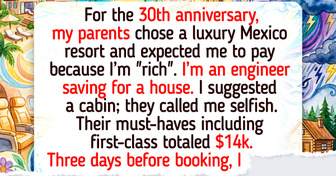It was not his money or their money. It was money your Mom made sure you had because she had her doubts about your father. Go to the police and explain everything or have them meet you at your guidance counselor's office. The school can put a lot of weight for you. Then press charges. If both girl's had the same Mother it would be harder. He had a fiduciary duty and relatively smallish figure would still be felony embezzlement. I would ask for emancipation and immediate return of the money plus reasonable interest. You have rights and it does not sound like a place I would want to live. File charges now and go to social media
My Father Gave My College Fund to My Stepsister — I Made Him Regret It
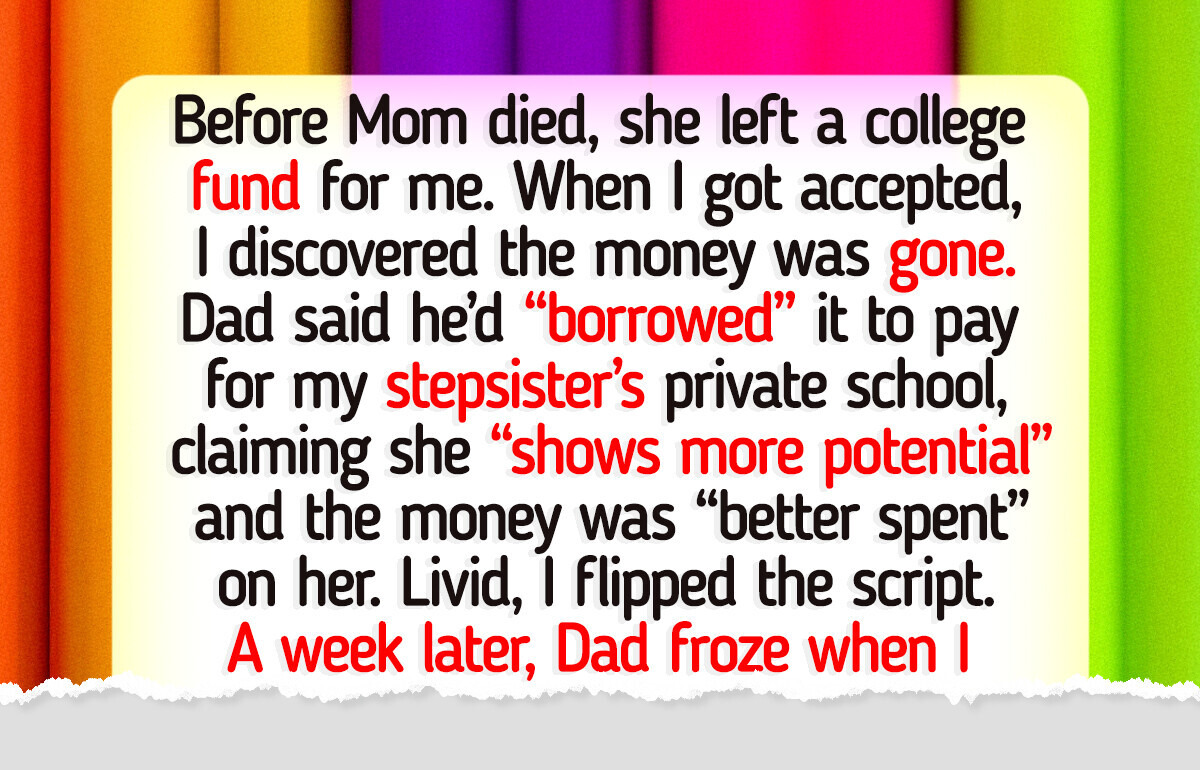
Family can be a source of love and support, but sometimes it’s also where the deepest betrayals happen. When trust is broken—especially by those we depend on most—the pain can be overwhelming, leaving scars that are hard to heal. Recently, a reader shared her story with Bright Side about facing such a heartbreaking situation with her own father and the difficult choices she had to make to stand up for herself.
Here’s Clara’s letter:
Hi Bright Side,
When I was 13, my mom passed away. My dad remarried a year later to a woman with a daughter my age. I tried to be open, but it was clear early on that my dad was way more invested in bonding with my stepsister than maintaining our father-daughter relationship. I became more like a guest in my own home. You know the drill: family photos without me, vacations scheduled during my exams, etc.
But I put up with it, mainly because my mom had arranged a college fund for me, with my dad in charge of keeping it safe until I was ready to use it after high school. I worked hard, got admitted into my dream school, and was ready to start this new chapter.
But I was shocked to find out that I had no money for my tuition. It was gone!
My dad eventually sat me down and explained that he had “borrowed” from my college fund to help pay for my stepsister’s private school tuition and academic programs. According to him, it was a necessary decision because she “shows more potential” and is “a brighter student” who “deserves every opportunity to succeed,” so the money was “better spent” on her. He even said it would be a “waste” not to invest in her future, implying that mine wasn’t worth the same.

I was both livid and heartbroken. The betrayal cut deep—but instead of falling apart, I decided to flip the script and make sure my dad understood exactly what he’d done. I deferred my admission, took a deep breath, and got to work on a plan.
A week later, my dad froze when I walked into the living room with a packed suitcase and calmly handed him a letter. In it, I told him that from that moment on, I was done being the afterthought in his “new family.” I was moving in with my aunt—someone who actually saw my worth. Then I turned and walked out. No yelling, no tears, just silence.
The silence hit harder than any screaming match ever could. He tried calling, begging, even guilt-tripping, but I never picked up. By the time I started college—on scholarships, grants, and my aunt’s support—I was miles ahead, building a future that had nothing to do with him.
Now, years later, I’m thriving, and from what I hear, he’s still scrambling to patch together the family he chose over me. And honestly, sometimes I wonder if I was too harsh—if I should have tried to forgive him or at least stayed in touch. Maybe the way I handled things wasn’t the easiest path, but at the time, it felt like the only way to make him truly understand what he’d lost.
Clara
Thank you, Clara, for opening up about such a deeply painful and personal chapter of your life. Your strength, resilience, and honesty are remarkable, and they deserve to be acknowledged. To help you reflect and move forward with clarity and peace, here are five distinct pieces of advice—each offering a different perspective. Whether you’re seeking closure, exploring forgiveness, or focusing on the life you’ve built for yourself, these insights are meant to honor your journey and support your healing.
Closure Isn’t Always Contact
You made a choice that protected your mental health and self-worth, and that decision deserves respect—even from yourself. Sometimes closure doesn’t come from repairing a relationship but from accepting that you did what you needed to do to survive and grow. If guilt still lingers, try writing an unsent letter to your dad—say everything you’d want him to know, good and bad—then let it go. Healing doesn’t require reopening the door to someone who repeatedly proved they didn’t value you. Give yourself permission to find peace without rekindling a painful dynamic.
Forgiveness Without Reconciliation
Forgiveness doesn’t mean saying what he did was okay; it means freeing yourself from the weight of anger and resentment. You can choose to forgive him in your heart without ever speaking to him again. This quiet kind of forgiveness is powerful because it shifts the control back to you—you decide what occupies your emotional space. Over time, that release can help you focus more on your own growth instead of what he cost you. Forgiving without reconciling can be your way of closing the book while still keeping your boundaries intact.
Redefining Family

So he paid for HER potential with YOUR money. He'll be paying for it the rest of his life. Especially if you sue him.
Blood made him your father, but his actions showed you that family is built on love, loyalty, and mutual respect. The bond you created with your aunt is proof that you can build a supportive, nurturing “chosen family” where you feel safe and seen. Keep investing in those relationships and create new ones that reinforce your worth. By surrounding yourself with people who show up for you, you’ll erase the narrative that you weren’t enough. That’s the best kind of revenge—turning what was meant to break you into the foundation of a stronger, healthier life.
Taking the Lesson, Not the Hurt
What your dad did was cruel and unjust, but it taught you something invaluable: that your success belongs entirely to you. Every achievement you’ve earned—from securing scholarships to thriving independently—proves your strength and resilience. Instead of focusing on what you lost, try to celebrate the freedom you gained by not needing his approval or support to build your future. Let this experience shape you, not define you—so that when you build your own family or mentor others, you’ll know how to give the love and fairness you didn’t receive. That’s how you turn pain into purpose.
Testing the Waters of Reconnection

If part of you is curious about whether the relationship can ever heal, you can explore that without putting yourself at risk. Start small: a letter, an email, or even a message that simply acknowledges the distance but expresses openness to hearing him out. Make sure you set boundaries in advance—decide what behavior you won’t tolerate and what topics are off-limits. If he responds with genuine accountability and respect, you can decide whether a cautious reconnection is worth trying. But if his response shows the same patterns as before, you’ll know you made the right choice in keeping your distance.
Sometimes, it’s the quietest moments that reveal the biggest truths. A small change, a subtle gesture, or even a brief silence can alter the course of everything. Recently, a Bright Side reader shared a letter about one such moment that completely transformed the way she saw her marriage.
Comments
He is lucky he wasn't MY father I'd have sued him till he was a broke beggar on the street. I bet steps would ditch his sorry butt then!! I HATE "parents" (I use that term loosely) like this😡
I want to share my testimony on how i was able to get back my husband around October last year with the help of Dr. Osoba . My husband left me for over 3years and went on with another lady and i was unable to move on with my life because of the love i have for him, i was searching something on the interest when I saw a testimony on the internet on how Dr. Osoba help someone with love spell so i never believe it, but I just say let me give a try with my faith which i did and i contacted him on his (email: Drosobasolutioncenter@gmail.com) and he told me what i need to do and after 2days i received a call from my husband asking me to come back to him it was all like a dream to me i am so happy now as we are back together again thanks to Dr. Osoba and i will advice anyone going through any type of that your solution is here just contact him: though WhatsApp +2250503640803
What you old man did was illegal. Get a lawyer & get your money back
Borrowing it to help your step sister would mean that he paid it back so it was there when you went to college. He did not do that. He did not borrow it. He stole your inheritance and gave it to his wife's child. No you were not too harsh.
If this story is true then it's also illegal. OP should press charges for theft
Related Reads
13 Stories That Prove Kindness Is the Quiet Superpower We All Share
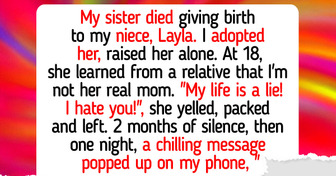
My Sister Refused to Let Me Be in Her Wedding, and the Reason Shattered Me
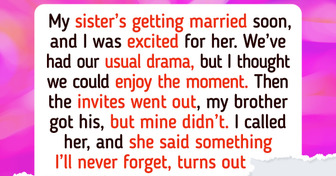
I Refused to Babysit My Sister’s Kids for Free, Now My Whole Family Is Against Me
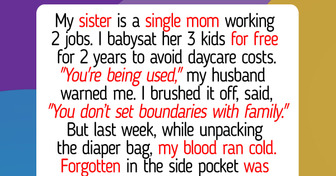
I Refused to Let My 32-Year-Old Daughter Live With Me Rent Free—Until She Told Me the Real Reason
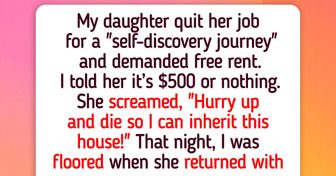
I Asked for a Raise After 10 Years and Lost My Job — They Didn’t See My Next Move Coming
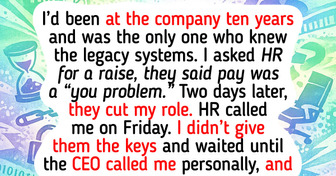
10 Times Kids Spilled Family Secrets and Shocked the Entire Room
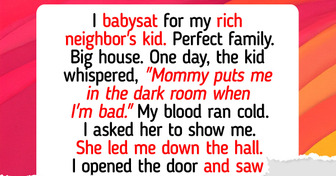
I Lost a $120K Job Over a Ridiculous Interview Test

I Refused to Fire a Soon-to-Be-Mother and End Her Career Just Because I Am in HR
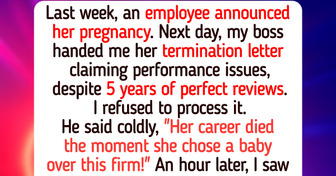
16 Tiny Acts From Strangers That Left Permanent Marks on People
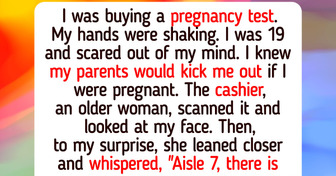
16 Men Who Proved True Love Isn’t About Big Words, but About Quiet Actions That Melt the Heart
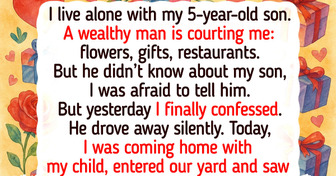
13 Double-Life Stories That Prove Even Those Closest to Us Have Secrets
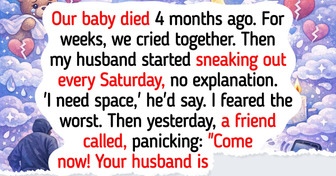
My Parents Wanted a ‘Family Vacation’ on My Budget—I Made One Move They Didn’t Expect
